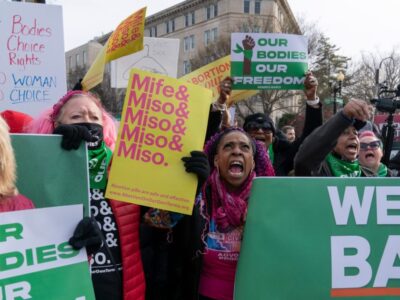
Before Roe v. Wade was overturned in June 2022, abortions in Florida were available until 24 weeks of pregnancy; soon afterward, a 15-week ban became law. Still, Florida remained an essential abortion haven for the Southeast. Then, on May 1, a six-week ban took effect, and the impact was immediate and drastic—and not just in the state, new data from the Guttmacher Institute shows. Clinician-provided abortions plunged in Florida by more than 30 percent in May and June, to an average of about 5,400 abortions per month. In contrast, during the first three months of the year, the state averaged about 8,000 abortions every month.
“Our data paint a vivid picture of the chaos and confusion caused by Florida’s six-week abortion ban,” Isaac Maddow-Zimet, a Guttmacher data scientist, said in a statement.
Nationally, the average number of abortions in May and June fell by more than 7 percent from the first three months of the year, according to Guttmacher’s Monthly Abortion Provision Study. More than a third of that drop is the direct consequence of the Florida ban, highlighting how important a role the state has played in abortion access throughout the South. In 2023, an estimated 9,000 out-of-state patients traveled to Florida to obtain an abortion, with the largest number of them coming from Texas, Louisiana, Mississippi, Alabama, and Georgia—all states where draconian abortion laws have been put in place since the Dobbs decision. Before Florida imposed its own six-week ban, more than 1 in 10 abortions in the US happened there.
The drop off in Florida abortions in May and June likely reflects reductions in access to abortion for patients from neighboring states with total or near-total bans of their own, as well as for state residents, Guttmacher says.
“Our data paint a vivid picture of the chaos and confusion caused by Florida’s six-week ban.”
The new report comes as reproductive rights advocates are pushing hard to pass an abortion rights ballot measure that would override Florida’s six-week ban. If approved in November, Amendment 4 would guarantee the right to abortion up to fetal viability—around 24 weeks gestation—or when necessary to protect the patient’s health. Supporters collected almost 1 million signatures to get the amendment on the ballot, making Florida one of 10 states with abortion measures in the fall. But to pass in the Sunshine State, the amendment must receive at least 60 percent of the vote, unlike in states such as Ohio, where a similar ballot initiative in 2023 only required a simple majority.
As my colleague Julianne McShane has reported, the administration of Gov. Ron DeSantis seems to be doing everything it can to undermine the amendment, including launching a new website that attacks the initiative with “a litany of false claims.” These include that the measure “threatens women’s safety,” would “eliminate parental consent” for minors seeking abortions, and could “lead to unregulated and unsafe abortions” by allowing people without healthcare expertise to perform the procedure. Abortion rights groups have sued to block the misinformation campaign.
DeSantis officials have also been scrutinizing tens of thousands of petition signatures for evidence of fraud, even sending election police to the homes of some voters to verify their signatures. State officials certified the signatures in February, and the deadline for challenging them has passed. The ACLU of Florida has threatened to sue on behalf of the group leading the Yes on Amendment 4 effort, Floridians Protecting Freedom. Meanwhile, seven Florida congressional Democrats have written a letter asking US Attorney General Merrick Garland to investigate the DeSantis administration’s “brazen attempts at voter intimidation and election interference on Amendment 4,” the Florida Phoenix reported.
DeSantis signed the six-week ban in the spring of 2023, giving reproductive rights advocates in the state more than a year to prepare for the worst. The Florida Supreme Court upheld the ban this past April 1—the same day it also approved Amendment 4 to be on the November ballot. In April, abortions surged by 21 percent in the state. “Providers and patients went to great lengths to provide and access care, respectively, before the law went into effect,” on May 1, Guttmacher says.
The Florida ban’s impact likely was also mitigated by the availability of medication abortion via telehealth from providers in states with abortion shield laws, Guttmacher notes. Telehealth abortions now account for nearly 1 in 5 abortions in the US.
But travel distances are adding additional burdens for abortion patients. If a Florida resident needs to have an abortion after six weeks of pregnancy, the closest clinic would be in North Carolina—which would require traveling an average distance of about 590 miles, Guttmacher says. Add to that, patients have to jump through numerous unnecessary hurdles to access care there—including in-person counseling 72 hours before obtaining an abortion. Since abortion is now banned in North Carolina after 12 weeks, many Florida residents are being forced to travel farther distances to states with fewer restrictions, including Virginia and Illinois, or to Puerto Rico. “Raising money for the cost of
the abortion, travel and lodging, missed wages, child-care costs, and more means that the difficulties of receiving needed abortion care are substantially increased and for some, insurmountable,” the Guttmacher report says.
According to new polling by The Hill and Emerson College, 55 percent of likely Florida voters support Amendment 4—a solid majority of the electorate but shy of the threshold needed to pass the measure. Another 20 percent of voters said they were “unsure.” Among the wafflers has been former President Donald Trump, who appeared to support the amendment in an interview with NBC News last month, triggering a ferocious backlash among the conservatives whose support he needs if he has any chance of beating Vice President Kamala Harris in November. The next day, Trump said he would vote against it, even as he told Fox News that he still thinks the six-week ban is too strict.















